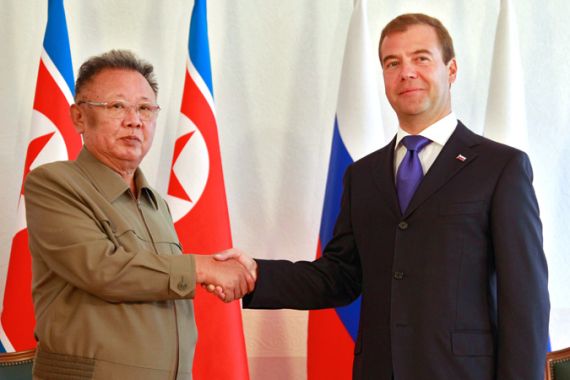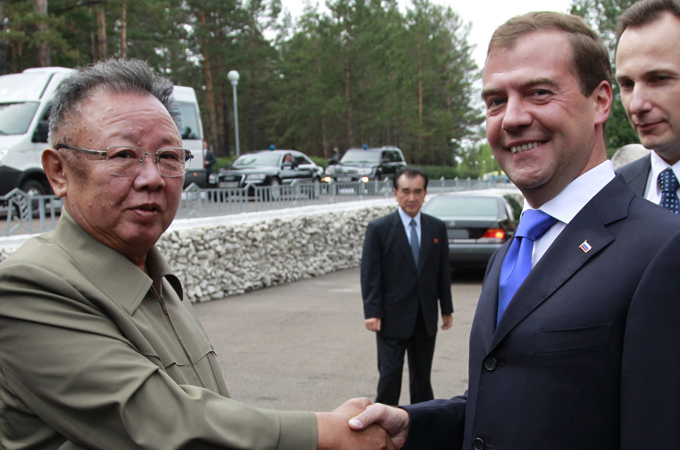The Dear Leader does Pipelineistan
North Korean leader Kim Jong-Il, an old-style political poker player, gets Russia to back his game.

 |
| Kim Jong-Il offered Russian President Dmitry Medvedev the right to build a trans-Korean pipeline [EPA] |
As much of the world – and news headlines – were transfixed by NATO’s “humanitarian” war in Libya, few noticed as a 69-year-old sporting a trademark Mao-style khaki jumpsuit and wearing sunglasses stepped out of a black armoured Mercedes in the back of beyond in Siberia.
Our character was, of course, the inimitable Dear Leader of the Democratic People’s Republic of Korea (DPRK), Kim Jong-Il. Notoriously aviation-averse, Kim was rolling down the tundra in splendourous Old World style, in a carriage offered as a gift to his father, DPRK’s founder Kim Il-Sung, by none other than Joseph Stalin.
I had seen the carriage in North Korea last year – and it is indeed a smashing 1950s masterpiece; but now, according to the Interfax agency, “luxuriously restyled” and internet-friendly, with slim LCDs replacing old-school Sony Trinitrons.
The Dear Leader rolled into Sosnovy Bor (“Pine Forest”), a military base 50 km east of Buryatia’s capital Ulan-Ude, in eastern Siberia just across Lake Baikal, with a cracking smile on his face. He had just experienced, according to the AP’s dodgy translation, “a fun trip”; but we may be certain this Americanism was not exactly what he conveyed in Korean to his Russian hosts.
By contrast, when he left Sosnovy Bor after meeting Russian President Dmitry Medvedev, the Dear Leader must really have been in a swell mood.
He had just offered Medvedev a bag full of juicy goodies: the green light for a major trans-Korean Pipelineistan gambit, a moratorium in the production and testing of nuclear weapons, and the promise to restart nuclear talks “without preconditions”.
Of course a nagging question remains. Muammar Gaddafi’s fate was sealed when he renounced his nuclear program in 2003 – following the advice of his Europe-infatuated offspring – and placed the survival of his regime in the hands of NATO.
Not even the Holy Ghost would be able to convince the Dear Leader to follow the same route and get rid of his nuclear arsenal, but that’s another story.
Gas or plutonium?
Medvedev – how could he not? – loved the get-together (the talks were “open” [and] “substantive”). As for the inscrutable Kim, he might be reveling about how much of a brilliant tactician he still is.
North Korea still owes $11bn to Russia, a leftover from the Soviet era. Medvedev must have been so excited that no one even talked about it. Anyway, since early August Russia will be shipping 50,000 tons of grain to North Korea every month to stave off famine. The DPRK certainly doesn’t have the means – for now – to pay its debts.
Exporting Siberian gas across the Korean peninsula is a win-win situation. The idea has been around for at least 20 years.
The late Chung Ju-yung, the founder of Hyundai (who, by the way, was born in the North), first tested the waters when he went to North Korea in 1989. But he was light years ahead of his time.
The problem is that the two Koreas’ mutual hate increased exponentially these past few years. Additionally, the Kim-Medvedev meeting was barely over when the usual Cold War-minded suspects came up with the same talk of “unacceptable” political leverage to be handed to the Kim dynasty.
Yet a Pipelineistan gambit is certainly a more intelligent approach than cornering the Dear Leader like a wounded animal, thus allowing him plenty of room to toy with weaponised plutonium enough for at least six bombs, and the possibility of mounting a nuclear bomb on a long-range Taepodong missile.
The subtext is equally fascinating. Medvedev may have been using North Korea to send a message to China, pressing Beijing to finalise its own gas deals over two pipelines coming from Russia.
Yet these two pipelines are not exactly a top priority for China, considering that Beijing relies on vast quantities of imported gas from Iran and Central Asia.
But the pipelines are a priority as part of Gazprom’s Asia Pipelineistan blitzkrieg: betting on an incredibly expanding market compared to infinitely problematic, and stagnated, European markets.
Immediately after the Kim-Medvedev meeting, Beijing announced it wanted to build an extra 7,000 km of Central Asian Pipelinestian by 2015, thus doubling its gas imports.
This means that China will be importing 60bn cubic metres of gas a year from Central Asia – roughly the same amount that Russia has offered to go through both pipelines.
Now for the road map
So the current road map goes something like this.
China is in fact competing directly with the US to be the world’s biggest economy.
Russia, first of all, needs to prop up its own economy by diversifying its energy exports. If Russia links the Trans-Siberian railway to both Koreas, it will boost the economy of its far eastern regions.
To sell gas and oil to voracious South Korea, a Russian pipeline must imperatively cross the North.
Heavily industrialised South Korea imports all of its oil; it’s the fifth-largest importer in the world, and the second-largest of liquefied natural gas (LNG), only behind Japan. South Korea is not part of Pipelineistan; everything arrives by supertanker.
North Korea may earn more than $500m a year in pipeline transit fees for gas alone. Apart from the 1,100-km-long pipeline – including 700 km in North Korea – it could also clinch a crucial electricity deal with the Russians, cranking up the DPRK’s power grid and its industries. The fact that the DPRK diversifies its dependence on China also helps.
Politically, China supports the North. The US supports the South. Russia supports both.
So, welcome to a new “sunshine policy” with Russian subtitles – with Moscow playing the role of peacemaker.
Impeccable timing
Even Beijing apparently liked the whole thing – with official spin pouring out that the Cold War is now over and Beijing and Moscow need to work together and coordinate their actions in North Korea.
For aviation-averse Kim, stepping out of Pyongyang always involved only three possibilities. South to Seoul: not now, not yet. China: he’s done it three times lately. That left Russia, to the northeast. He took it.
The Dear Leader could have profited from a visit to Skovorodino; that’s the starting point of a 1,000 km oil pipeline to China and Russia’s Pacific coast. But he sidelined it.
Still, his sense of timing in playing the Russian card was simply astonishing. Beijing was sure it was the only one certified supporter of Pyongyang. That’s until the Dear Leader reminded all players that he’s very, very good at playing off one super or middle power against another.
The DPRK, of course, remains hyper-paranoid as far as any suspicious, corrupt, Western capitalist/”puppet clique” in South Korea influences are concerned.
But when it comes to a pan-Korean pipeline – energy supply – that’s OK. As North Korea analyst Aidan Forster-Carter has observed, “all Pyongyang has to do is to sit there and collect a fat rent. Or if it gets bored, turn the tap off for a bit – just for a laugh.”
North Korea is in fact obsessed with 2012. That’s the hundredth anniversary of Kim Il-Sung’s birthday. Setting up a good relationship with both Russia and China is a major PR coup.
So the ball is now in the South’s court. There are also elections in South Korea in 2012. President Lee Myung-bak is a lame duck; not only can he not run for another term, but his hardball policy against the North has miserably failed.
This means that the new man in Seoul will have to try some sort of appeasement. Enter the peacemaker winner – the pan-Korean pipeline. Friendly advice to all Dear Leader-ologists: Don’t try to play poker with him.
Pepe Escobar is the roving correspondent for the Asia Times. His latest book is Obama Does Globalistan (Nimble Books, 2009). He may be reached at pepeasia@yahoo.com.
The views expressed in this article are the author’s own and do not necessarily represent Al Jazeera’s editorial policy.
